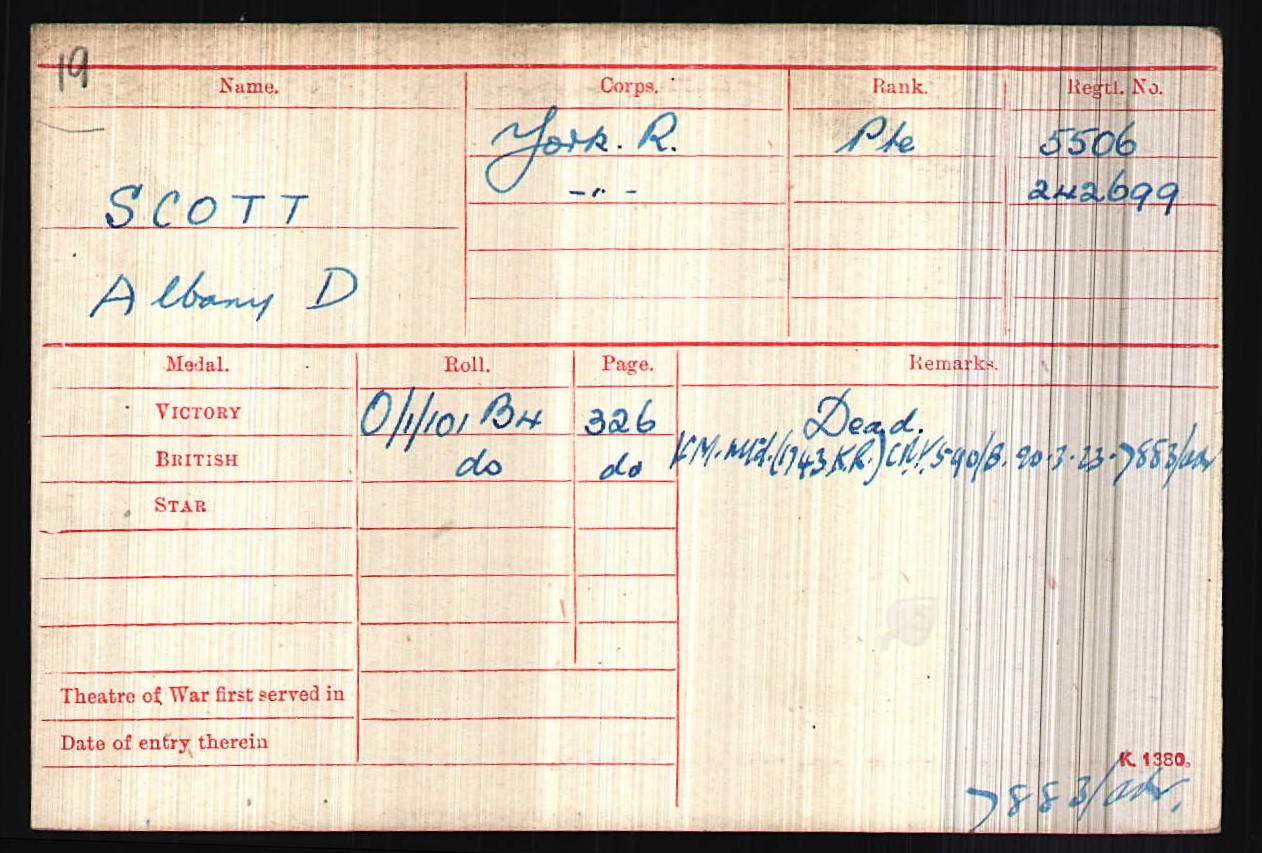
Albany was born on the 18th April 1882 to Robert Scott and Elizabeth Bridgwood in Bradford, Yorkshire and was 32 years old when war broke out. He was married to his wife Mary Ascough, had two young children, son Kenneth and daughter Olive. He had a job as an estate gardener and lived in a tied cottage in Snainton, Yorkshire. He enlisted in Scarborough and it is unclear why he joined the war effort with the Territorial Force but it was said he was not a drinker and had numerous Temperance Medals to prove so!
He began his military career as a member of the Territorial Force with the service number 5506. His medal roll adds that he was in both the 6th and then the 5th Battalions of the Yorkshire Regiment, before he was transferred into the 2nd Battalion Yorkshire Regiment in 1916, with a new service number of 242699, possibly first seeing action at the southern end of the British Somme offensive line and at the battle of Transloy Ridges, in October 1916.
During this time period he came home wounded, was allowed to recuperate, and once he was fit, he returned back to the front line in early 1917. During the German Spring Offensive of 1918, the Germans grouped in thick fog and overran the trenches where Albany was fighting and took him, along with many others, prisoner on March 22nd. Unfortunately a shell exploded nearby and captors and captured alike were killed. He was 4 weeks short of his 37th birthday, leaving behind his family and quite a legacy…
Explore more memories from the ribbon
-
Ernest Scriminger
Submitted by Paul Elliott. My Great Uncle, Ernest Scriminger was born in Leeds in 1886. He was the eldest son in a family of 4 sons and 5 daughters. he worked as a grocer’s assistant before joining the 3rd Battalion of the West Yorkshire Regiment and serving in the Boer War. He enlisted in the Green Howards in November 1904. he was almost 19 years of age, but was less than 5’4″ tall and only weighted 8 stone. The 2nd Battalion spent time in India and on garrison duty in South Africa before he transferred to the reserve. He was recalled to the regiment on the outbreak of war in 1914 and went to Belgium in the October. He would have served in the 1st Battle of Ypres and at Estaires. 1st Ypres saw the 2nd Battalion reduced in strength from 1000 men to only 300, with 250 killed and many wounded and missing. He was reported to be involved in the action at Neuve Chappelle on 12th March 1915, in which Corporal William Anderson won the Victoria Cross. Corporal Anderson lead a bombing unit of 9 men and succeeded in driving off the enemy with his bombs and those of his injured men. He is reported to have taken a large number of prisoners. He later died attempting a similar action. Ernest was wounded and taken prisoner. He died in a prisoner of war camp at Nider Ochtenhausen a year later. Only a week after receiving a letter from…
-
John Magee
Christine Howie (née Magee) visited the museum to tell us about the sad story of her Grandfather, John Magee who was born in Birkdale in 1889. 30876 Private John Magee enlisted on 24th July 1915 and served with the 12th Battalion of the King’s Liverpool Regiment during the First World War. He was wounded by a shell burst which damaged his left wrist and led to him being hospitalised. The distinctive ‘hospital blues’ are shown on his photo, a uniform worn by enlisted men during treatment. The fingers of his hand were badly damaged and as a result he received the Silver War Badge – according to regulations he was “no longer physically fit for war service”. At home in Southport John’s wife Annie was looking after the two children. In the photograph, Christine’s father Harry is depicted age three, with his elder brother John Alfred. Tragically, as the extract from her death certificate shows, Annie was to be one of the victims of the outbreak of Spanish flu. Her death came just a few days after the signing of the Armistice that brought about an end to the fighting. John’s sister Kitty took care of the children until John returned – to bring Harry and John Alfred up as a single parent.
-
Corporal Tommy Edwards
Steven Shackleton told us about his great uncle, Thomas Edwards from Ironbridge. During the First World War, Tommy Edwards was a Corporal in the King’s Own Yorkshire Light Infantry. Prior to the war he had served as 86589 Pte T Edwards with the Territorial Reserve Battalion. He served with the 10th KOYLI and then transfered to the 2nd KOYLI before he was killed in action on 30th September 1918, aged 19. He is buried at Bellicourt British Cemetery in France. His mother was Mrs Francis Edwards of Hoylake, Cheshire and had the following inscription added to the bottom of his headstone: ‘Peace, perfect peace’.
